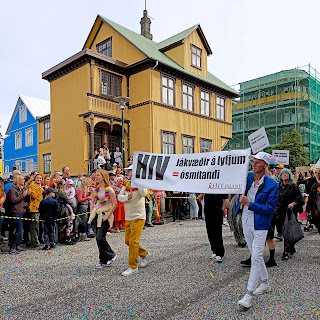The "hinsegin dagar" , the " queer days ", have been celebrated in Reykjavík since 1999. The first parade through the city took place in 2000, with around 12,000 visitors.
The Icelandic word " gleðiganga " means something like " run of joy ".
A proud partner of the Pride Parade is also the city of Reykjavík , which takes part in the parade every year with a large group. The city says it is proud of its queer employees.
The mayor also marches every year, here in the picture the incumbent mayor Einar Þorsteinsson is walking next to his wife, who is pushing their offspring in the stroller, and is holding up a poster: The fight is not over yet, we are proudly carrying on!
The parade began at the stroke of the Hallgrímskirkja bell at 2 p.m.
Here's another reminder: Don't panic about HIV-positive people. Nowadays, those affected are treated with appropriate medication so that they do not pose any risk of infection!
I found the Gleðiganga this year more political than usual.
Here is a group who, among other things, are holding up signs with the demand or statement "Hinsegin flóttafólk á heima hér", "Queer refugees are at home here".
According to media reports, around seven families from Venezuela, who had been living in Iceland for one to two years but whose asylum applications had been rejected, were deported from Iceland in the evening on the day of the Pride Parade. A group of Venezuelans protested at the airport in Keflavík against the deportation of their compatriots.
According to the chairwoman of the General Affairs Committee, the affected people were "encouraged" to voluntarily return to Venezuela. In a press release on Saturday, she said that the proportion of asylum seekers in Iceland is very high in relation to the population and that the government's aim in recent years has been to reduce this proportion.
For a time, people from Venezuela applying for international protection in Iceland were granted temporary residency rights, but a decision to this effect in 2022 was reversed in 2023. The immigration authority was authorized to reject applications for international protection from people from Venezuela on the grounds that the situation in their home country is improving. Since the beginning of 2024, Iceland has been deporting rejected asylum seekers to Venezuela.
The refugees from Venezuela decided to come to Iceland because they believed they would be safe here, especially since the country does not have diplomatic relations with Venezuela. Individuals affected by the flight on Saturday evening told Icelandic media that they had "voluntarily" signed a willingness to leave the country because otherwise they were threatened with the police. The immigration authority is of the opinion that, despite the unrest after the presidential election on July 28, 2024, deportations to the South American country can still be judged to be so safe that there is no obstacle to the departure of rejected asylum seekers to Venezuela; There should be no special regulations for Venezuelans.
Another group protested for freedom in Palestine under the slogan "No Pride in Genocide". Many participants in the parade wore Palestinian scarves. Sometimes "Intifada" was chanted, if I understood correctly.
Amnesty International called for human rights under the motto “Human Rights are my Pride”.
Beautiful, flashy, colorful and powerful - the costume with the white feathers always needed someone to help. But it looked very nice!
By the way, as every year, the Fríkirkja parish priest stood on a table in front of his church door in full regalia, with a flower chain around his neck and flags in his hand, and eagerly and cheerfully blessed the procession as it passed by.
I noticed afterwards that the steps to the altar in Hallgrímskirkja , the parish church of the Icelandic State Church ( Íslenska þjóðkirkja ), were also decorated with a large rainbow flag. The statement on the church's account states that the "hinsegin dagar" are important, they "draw attention to inequality and violence and break the silence." "The Hallgrímskirkja supports the fight for the rights of the queer community". I would also like to see such an explanation from the large churches in other countries, especially in my home country Germany!
Here again the call for more moral courage: We support our queer friends. What's wrong with you?
The end of the 2004 Pride Parade was the float with the large wedding cake, with the well-known Icelandic singer Páll Óskar and his husband Antonio standing on the cake. The two have been newly married since March 2024. Antonio came to Iceland as a refugee from Venezuela and he and Páll met on a dating app and fell in love. With the wedding cake they also wanted to celebrate living in a country where they can get married.
Páll said in an interview that he wanted to "bake a wedding cake" to commemorate the first rights granted to queer people in 1996, when gays and lesbians were allowed to enter into permanent, state-recognized relationships. “These were the first signs that we were not second-class citizens,” said Páll Óskar. “So the wedding cake means a lot to a lot of people.”
In Iceland, there has been a registered partnership for same-sex couples since 1996, and the marriage laws were reformed in June 2010. The first couple to make use of the new legal regulations were the then Icelandic Prime Minister Jóhanna Sigurðardóttir and her partner, the writer Jónina Leósdóttir . For comparison: In Germany, registered partnerships have only existed since 2001, and “marriage for all” has existed since October 2017.
[Translated from here.]





















No comments:
Post a Comment